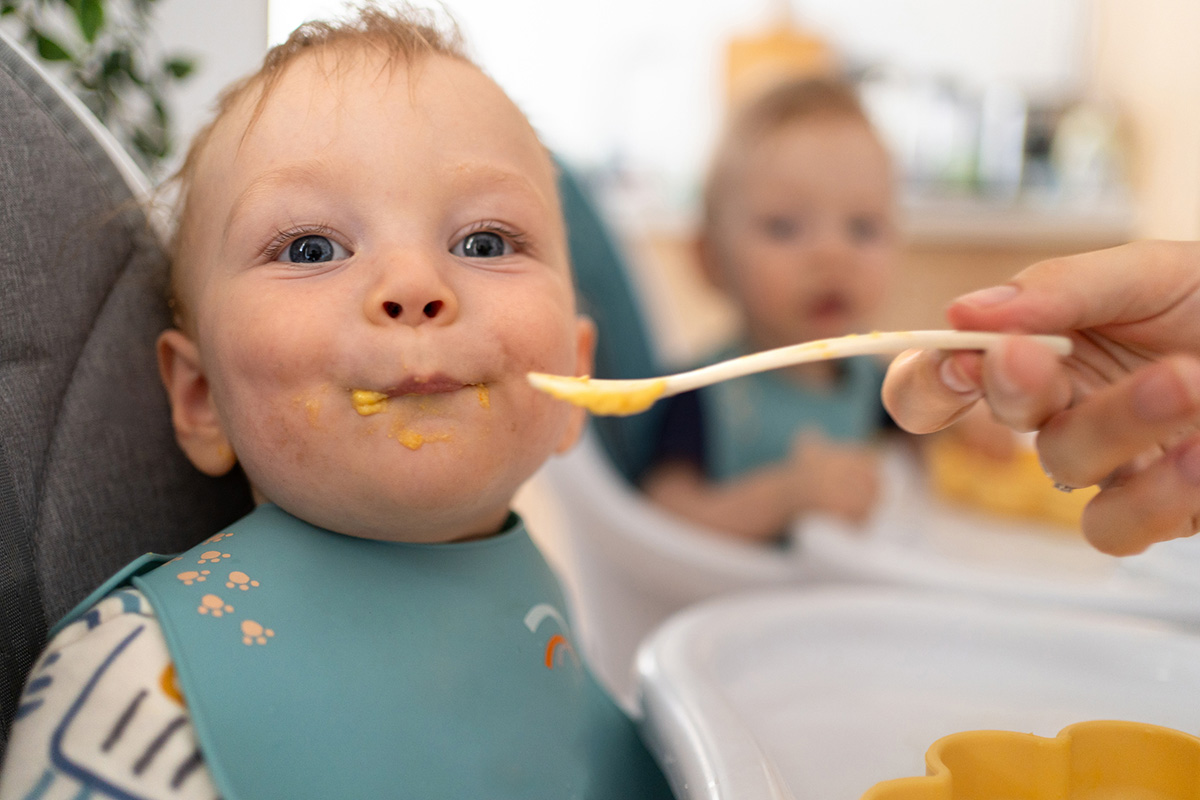
By Shayna Codrey, NP, Premier Pediatrics
As a parent, one of the most exciting milestones in your baby's development is the introduction to solid foods. Whether you're breastfeeding or formula-feeding, it’s essential to recognize when your little one is ready to explore the world of solids.
The American Academy of Pediatrics recommends exclusive breastfeeding for the first six months of life, with gradual introduction of solids thereafter. But how do you know when the time is right? Read on to discover the developmental signs that indicate your baby is ready to take their first bite of solid foods, and how to make the transition smooth and enjoyable.
Developmental Cues
Although there is no universal age for when to introduce solid foods, there are some developmental cues that can help you determine if your child is ready.
- Gaining necessary weight. Typically, your baby’s weight should be double their birth weight when they are 4- 6 months old. They may be ready for solid foods if they weigh 13 pounds or more.
- Holding their head up. Before transitioning to solid foods, your baby should be able to safely sit in a highchair, feeding seat, or infant seat while holding their head up.
- Having an interest in food. If your baby is showing an interest in food by watching you eat, reaching for your food, or having an eagerness to be fed, they may be ready for solid foods.
- Moving food from a spoon with their tongue.
If your baby is at least 4 months old and is showing the developmental cues above, you can start them on solid foods. However, even if your baby shows these signs before 4 months, you should wait. The American Academy of Pediatrics recommends starting solid food at 6 months. The risks of starting your baby on solid foods too early include choking or inhaling solid foods into the lungs due to not having the coordination necessary to swallow them as well as an increased risk of obesity later in life.
How to Transition to Solid Foods
Initially, your baby will still be getting most of their nutrition from breast milk or formula while you gradually incorporate solid foods. You should always feed solid foods to your baby after nursing, not before, so they fill up on breast milk and receive the nutrition they need. This will be the case until your baby is about 1 year of age.
Ideally during a mealtime, you can feed them a single-grain, iron-fortified baby cereal such as oat, barley, rice, or multigrain cereal. Avoid feeding your baby only rice cereal due to possible exposure to arsenic. Mix 1 or 2 tablespoons of cereal with breast milk, formula, or water. Iron-rich puréed meat is also an option for your baby’s first solid food. Feed them with a small baby spoon, not a bottle, unless your doctor recommends it.
Never force your baby to eat if they cry or turn away when introducing them to solid foods. Just return to breast or bottle feeding exclusively and try again in a couple of days.
As your baby becomes more comfortable eating solid foods, you can gradually increase the amount of food you give them and introduce others, such as puréed fruits, vegetables, beans, lentils, and yogurt. You may introduce one new single-ingredient food from any food group every three to five days.
Starting Finger Foods
Once your baby is comfortable with puréed solid foods, you can begin to give them finger foods if they can sit up and bring their hands and other objects to their mouth. Prevent choking by giving them soft, easy-to-swallow, small pieces of solid foods.
Some examples of safe solid foods include small pieces of banana, wafer-type cookies or crackers; scrambled eggs; well-cooked pasta; well-cooked and finely chopped chicken; and well-cooked, cut-up potatoes or peas.
Processed foods made for adults and older children should be limited as they can contain more sodium and preservatives. When giving your baby fresh foods, make sure they are cooked with no added seasonings and are blended or mashed. Refrigerate any leftovers and mark them with the date they were cooked. Check for signs that the food has spoiled before giving it to your baby.
At this stage, babies should not be given food that requires chewing or could be a choking hazard. Avoid foods such as hot dogs, nuts and seeds, chunks of meat or cheese, whole grapes, popcorn, chunks of peanut butter, raw vegetables, fruit chunks such as apple, and hard, gooey, or sticky candy. Do NOT give a baby honey before 12 months of age.






